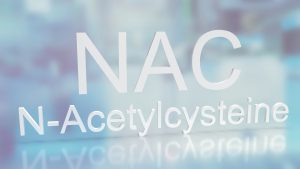A quick blood test will verify that 98% of you are carrying an inactive form of Epstein-Barr virus (EBV), one of several herpesviruses (human herpesvirus 4, to be exact) that can rest quietly in your body. You hope. That high percentage is confirmed by testing large populations for the presence of EBV antibodies, produced by […]
Tag: multiple sclerosis
NAC (N-acetylcysteine)
Produced by the body, N-acetylcysteine (commonly called NAC) is a form of the amino acid cysteine. Because it enhances the production of the Enzyme glutathione, one of the body’s powerhouse antioxidants, NAC can both stave off disease and play an important role in boosting the immune system. Studies have shown that glutathione levels are often reduced in people with certain conditions related to the immune system.
Zinc/Copper
The minerals zinc and copper can be purchased as single products, but there’s good reason to consider a combination product that pairs the two.
Zinc blocks the absorption and enhances the excretion of copper when taken over time. So, when zinc is recommended long term (over many months) for any condition–from arthritis to prostate problems or even Alzheimer’s–it’s important to get some copper as well. A combination product will help prevent a copper deficiency and the anemia that can develop as a result.
Vitamin D
Vitamin D is called the sunlight vitamin because the body produces it when the sun’s ultraviolet B (UVB) rays strike the skin. It is the only vitamin the body manufactures naturally and is technically considered a hormone. Essential for building strong bones and teeth, vitamin D also helps to strengthen the immune system and may prevent some types of cancer.
Vitamin C
In the eighteenth century, seasoned sailors found that by sucking on lemons they could avoid scurvy, a debilitating disease that often developed during long voyages when fresh fruits and vegetables were scarce. When the lemon’s key nutrient was formally identified in 1928, it was named ascorbic acid for its anti-scurvy, or antiscorbutic, action. Today ascorbic acid is widely known as vitamin C.
Vitamin B Complex
A high-quality vitamin B complex supplement will provide, in one convenient pill, a full range of B vitamins, including biotin, choline, folic acid, inositol, PABA (para-aminobenzoic acid), and the six “numbered” B vitamins–vitamin B-1 (thiamin), B-2 (riboflavin), B-3 (niacin), B-5 (pantothenic acid), B-6 (pyridoxine), and B-12 (cobalamin). Combination products can simplify the process of taking individual B vitamins for a range of ailments including alcoholism, depression, diabetes, hair problems, lupus, multiple sclerosis, and stress.
Siberian Ginseng
What Is It? Famed as an energy tonic in China since ancient times, Siberian ginseng only gained recognition in the West in the 1950s, when a Russian scientist (I. I. Brekhman) reported its notable stress-repelling powers. Healthy men and women taking the herb were found to better endure physical strain, resist disease, and perform tests […]
Magnesium
Essential for hundreds of chemical reactions that occur in the body every second, the mineral magnesium has received surprisingly little attention over the years. Recent findings, however, suggest that it also has important health-promoting benefits, from an ability to prevent heart disease to a role in treating such chronic conditions as fibromyalgia and diabetes.
Lecithin and Choline
Lecithin is a fatty substance manufactured in the body and widely found in many animal- and plant-based foods, including eggs, liver, peanuts, soybeans, and wheat germ. Lecithin is often used as an additive in such processed foods as ice cream, margarine, and salad dressings, because it helps blend (or emulsify) fats with water. Lecithin is also available in supplement form.
Flaxseed Oil
A source of fiber for linen fabric since ancient times, the slender flax plant (Linum usitatissimum) also boasts a long history as a healing herb. First cultivated in Europe, the plant’s brown seeds were regularly used to prepare balms for inflamed skin and healing slurries for constipation. Today, flaxseeds–also called linseeds–are best known for the therapeutic oil that is derived by pressing them. Rich in essential fatty acids, or EFAs, flaxseed oil has earned a solid reputation for treating a range of ailments, from heart disease to lupus.
Evening Primrose Oil
Evening primrose oil is extracted from the evening primrose plant (Oenothera biennis), a wildflower found in North America, Europe and parts of Asia. The plant’s pale yellow flowers open in the evening–hence its common name–and its seeds bear the special fatty oil that is used in healing today.
Coenzyme Q10 (CoQ10)
One of the world’s most popular supplements, the chemical coenzyme Q10 has generated great excitement as a heart disease remedy and a cure for countless other conditions. The body naturally produces this compound, which has been dubbed “vitamin Q” because of its essential role in keeping all systems running smoothly. In fact, the scientists who identified coenzyme Q10 in 1957 initially honored its ubiquitous presence–it’s found in every human cell and in all living organisms–by naming it “ubiquinone.” Small amounts are also present in most foods.
